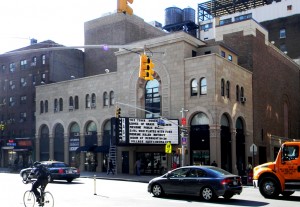The recent post on HG’s long ago Bar Mitzvah posed a challenge to those unfamiliar with Yiddish pronunciation. The ultimate hazard is the proper way to say ch. No, it is not pronounced like “charm” or “change” or “chance.” Thus, the word bucher is not pronounced similar to Sidney “Bechet” or like “butcher” with the elimination of the “t”. In Yiddish “ch” is a guttural sound. Like clearing your throat. It is the “ch” of challah (the egg bread baked with a distinctive twist and consumed on the Sabbath) and other essential culinary words such as chrain (horseradish, the eternal companion of gefilte fish). The sound is hard to master. Even BSK, a trained actress and perfect elocutionist, took some time to make the sound. Of course, after decades of marriage to HG, BSK’s Yiddish “ch” is as good as that of Molly Picon, the late, great star of the Yiddish musical stage. Many Yiddish words have entered common English usage. The only “ch” word that has gained popularity is chutzpah (nervy, arrogant behavior). HG grew up in a Yiddish speaking home. The language was often combined with English in a colorful conglomerate that could be dubbed “Yinglish.” When HG’s parents discussed topics forbidden to little HG like sex they spoke in Russian. The little fellow thought the language sounded musical.
Time For A Yiddish Lesson
December 8th, 2014 § 0 comments § permalink
Cafe Royale
March 28th, 2014 § 0 comments § permalink
The Cafe Royale, ah, the Cafe Royale!! Few people (and they are few, mainly men and women in their 90’s) who can say those words without a warm smile. The Cafe Royale had a long run: 1908-1952. It was located in New York on the corner of Second Avenue and E.12th (now a movie theater). For much of the cafe’s history, Second Avenue was the home of the Yiddish theater. There were numerous theaters and vaudeville venues. Stars galore: Jacob Ben Ami; Jacob and Celia Adler (their relations included Luther and Stella); Maurice Schwartz; Molly Picon; Menasha Skolnick. Aaron Lebedoff, Leo Fuchs and Moishe Oysher were vaudeville luminaries. Munii Weisenfreund (he changed his name to Paul Muni) and Walter Matthau were among the many actors who left the Yiddish theater to attain fame on Broadway and in Hollywood. HG only visited Cafe Royale in its final year — 1952. It was a sad place then, inhabited by old Yiddish actors bewailing (over numerous cups of tea) the death of a once vigorous theater. In its heyday, the Cafe Royale was the Yiddish Sardi’s—a schnapps and schmaltz fueled joint that teemed with Yiddish-speaking performers, composers, producers, set designers, musicians, press agents, dancers, playwrights—plus ardent fans and hangers on. It was one big Yiddish schmooze-fest and kibbitz. According to HG’s older friends, the Cafe Royale was the scene of theatrical feuds, naughty romance and artistic argument. The food and drink were savory. Voices were loud. Waiters were irascible. Hy Kraft, screenwriter and playwright, wrote a play about Cafe Royale, Cafe Crown. It opened on Broadway in 1942. Directed by Elia Kazan, it had a four month run. Kazan didn’t think much of Kraft as a playwright but said “He had a talent for the Jewish anecdote.” And, the play is as stuffed with Jewish jokes and anecdotes as an old Cafe Royale patron sitting back after a meal of chopped liver and Hungarian goulash. Joe Papp of New York’s Public Theater was fond of the Cafe Royale, the Yiddish theater and Cafe Crown. He revived the play in 1988 in a production starring Eli Wallach. Cafe Crown had another life in 1964. Kraft adapted it as a musical and HG/BSK went to the opening night. HG/BSK were pals with theater folks close to Kraft. The musical was not a success but it introduced a very engaging young actor, Alan Alda. HG/BSK joined Alda and his wife at Sardi’s for a post-theater dinner and found him to be a modest and amusing young man, surprising in someone whose star quality was so evident. Hy Kraft (he wrote it with Johnny Mercer) had a big hit in the Broadway musical (later a movie) Top Banana. It made Phil Silvers a star. Hy Kraft was an indomitable liberal. He defied the Red hunters and was blacklisted in Hollywood. Later, he battled against the American presence in Vietnam. The tragedy of his life was the early death of his daughter, Jill, a lovely and talented ingenue.
